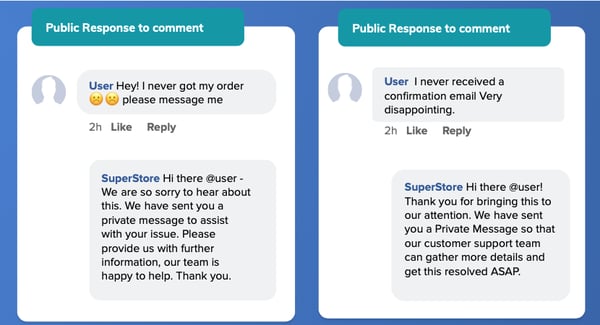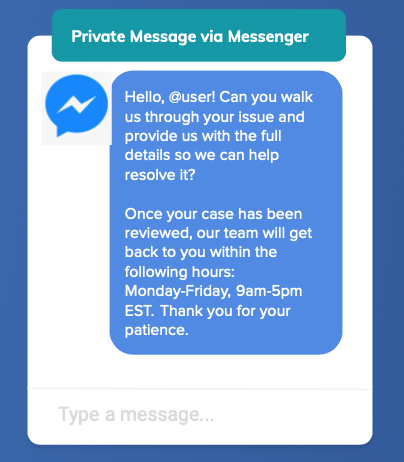
How to issue a private response to a public comment on Facebook
How to reply to a comment on Facebook privately
Customer service has changed quite a bit in the last decade from mostly call centers to various online platforms handling customer complaints and inquiries. Thanks to technological advancements and the general ease of use, social media has become an important player in the customer service space.
Many brands are already using social media to advertise their services and build brand awareness, so it is no surprise that businesses are getting more intentional about using social media for customer service. As the most popular social media channel with almost 170 million monthly active users, Facebook is particularly used by brands for customer support.
Today’s consumers expect brands to actively respond to their inquiries on social media—67% of consumers have reported using social media to ask a question or complain about a product or service.
How brands respond to customers on Facebook is crucial for customer engagement.
People reach out to brands because they expect them to understand their specific needs and respond to them in the next 24 hours. Issuing public responses to user comments not only addresses the inquiry at hand, but is also a great way to show legitimacy to other users scrolling through the comment section of your ads as they are making their purchase decision. For these reasons, BrandBastion recommends that no inquiry on social media is left unanswered.
However, after responding publicly to the initial customer inquiry on your Facebook page, it’s good practice to move communication with customers from the public comment feed to a private channel. Here are a few reasons why BrandBastion recommends issuing a private response to the user in addition to the public reply on their comment:
- The complexity of the issue: some customer complaints need more time to get resolved. We always recommend that you first reply to the comment publicly to let your customers know they are heard (we’ll share some examples of this later in the text) and also to inform them that you sent them a private message in which you will provide more details. This way, you will help a customer solve the problem and prevent the issue’s potential public escalation.
- Sharing personal information: in some cases, you will need customers’ personal data to solve their problems. Customer inquiries should move to private messages for safety reasons because nobody should get asked to or share their data, such as phone numbers, email addresses, and other sensitive information publicly.
- Increasing your audience: moving communication from public to private on Facebook allows you to use the open thread in Messenger to target and re-engage with the users in the future. Using Sponsored Messages on Facebook allows brands to create highly targeted promotions directly to people who have already communicated with your business in Messenger.
How to respond privately to public comments on your Facebook page
At BrandBastion, we know that customer support teams and social media managers already have a hard time tracking all the comments that are coming in 24/7. We decided to share a few examples of how BrandBastion helps brands move communication from public to private on Facebook:
1. Reply publicly to the initial comment your Facebook page
As we mentioned earlier, replying publicly to the initial inquiry from a customer on your Facebook page should be the first step. A public reply shows the customer that their voice is heard. At the same time, you are showing great transparency and responsibility to everyone who comes to your page to check the comments and reviews before buying your product.
When replying to customers on Facebook, don’t forget to address them directly, e.g., ‘@user’ because people may forget about posting an inquiry on your page. This way, they will get notified when you reply.
2. Make your responses more human
When customers reach out to your brand on social media, they expect a personalized response. At BrandBastion, we recommend that you always thank the customer for reaching out or apologize for the inconvenience, depending on the particular situation.
For example, adding phrases such as “We are happy to help,” or “We are sincerely sorry to hear that” can make your reply sound more human-like. A careful choice of words allows your customers to feel like their voices are heard and that their inquiries are in good hands.
3. Inform them about the private message in the public comment
This is the point where the shift from public to private communication happens on your Facebook page. It’s important to notify the customer about the private message because this way, the customer will pay attention to their inbox. Also, everyone else who reads public comments will know that the customer is being taken care of.
Here are a few examples of the initial public response on Facebook that contains all the elements from above:

4. Send a private message
Send a message using Facebook Messenger that will initiate the private conversation between you and your customer. In this message, you should ask the customer to walk you through the issue and provide more information. Make sure you send the message as soon as you reply publicly and don’t forget to stay as polite in private messages as you were in public comments.

5. Adjust your templates accordingly
It’s best practice to use templates when responding publicly and privately to your customers on Facebook, to ensure a consistent brand voice. However, you should also make sure that each message is personalized according to:
- The specific needs of the customer (as mentioned above, this is especially important to make your messages sound more human-like)
- Any unprecedented events that might have an impact on your business. For example, if your business is affected by the current COVID-19 pandemic, make sure you explain your company’s situation and how it can impact inventory and shipping.
Good examples of how brands respond on Facebook
Now that we learned the benefits of issuing a private response and what makes a good public and private message on Facebook, let’s check how successful brands do it in real situations. Here are a few examples of brands that respond excellently to public inquiries on Facebook and how they move the conversation from public to private.
Deciem
The beauty industry brands are facing high volumes of engagement on social media, with most large beauty brands receiving hundreds of comments and questions on a daily basis.
Deciem is a popular beauty company that owns and operates more than 10 brands in the beauty industry. The brand also has a strong social media presence on Facebook. With over 500,000 followers on their Facebook page, Deciem is very good at managing customer inquiries, responding to public Facebook comments, addressing the specific situation, and letting customers know that they sent a Direct Message to their inbox.
In their reply, Deciem chose a friendly approach as they thanked the customer for contacting them while quickly addressing the issue that customer had. The use of emojis in the brand’s replies adds to the general impression of Deciem being friendly with their customers on social media.

Warby Parker
For online retail and e-commerce brands, replying to customer inquiries in a timely manner on Facebook is very important for customer satisfaction and purchases. Warby Parker is an American online retailer of prescription glasses and sunglasses with over 700,000 followers on Facebook. The brand is another good example of how brands should manage customer inquiries on Facebook in a quick and effective manner by issuing a private response.
The tone and style that brands use when replying to their customers on social media depend on several factors, such as what industry they’re in and who is their target audience. In this example from Warby Parker’s Facebook page, the brand was concise while informing the customer about sending them a Direct Message in their reply to the public comment.

Revolut
Based in London, UK, Revolut is a financial technology company that makes it easier for their customers to manage and spend their money. The brand puts special emphasis on customer support too—in the About section of their Facebook page that has over 200,000 followers, Revolut provides more information about how their customers can reach them around the clock: “24/7 customer support to all users! Please open Revolut up and go to "Dashboard" and "?" to start a "New chat". Our support team is ready to help you.”
Revolut is another good example of how brands should manage public comments on Facebook pages. Similar to Warby Parker, Revolut’s style is focused on informing the customers about the Direct Message and letting them know that their issue is being taken care of.

Responses issued by brands on social media don’t necessarily have to fix all customer inquiries at hand. Regardless of the industry, consumers expect companies to acknowledge and respect their concerns promptly. However, some conversations should be moved from public to private once the initial public response is issued. Private messages give your brand more freedom to learn about the issues the customer is experiencing without the risk of things escalating in the comment feed or sharing private information publicly.
Tracking down and responding to all customer inquiries on Facebook can be time-consuming for customer support teams and social media managers to do manually in-house. At BrandBastion, we can manage customer engagement for you, 24/7, in up to 6 languages. Would you like to know more about how BrandBastion can help your brand?
